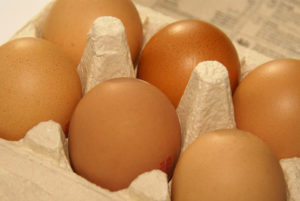A Good Egg?
This past July, the Humane Society of the United States (HSUS) announced that it was joining forces with a long-time adversary, the United Egg Producers (UEP), to push for federal legislation that would drastically reform the egg industry. In a joint press release, HSUS and UEP stated that this would be the “first federal law addressing the treatment of animals on farms,” including doubling the required living space allotted each hen. The law would also provide hens “with environments that will allow them to express natural behaviors, such as perches, nesting boxes, and scratching areas.”
 Controversy has surrounded the egg industry for years, in large part due to the routine abuse of the hens that produce much of America’s egg supply. Human health is another major concern, as unsafe and unsanitary hen house conditions can lead to salmonella outbreaks, like the 2010 outbreak in which almost half a billion eggs were recalled. The salmonella-tainted eggs were traced back to one chain of animal farms that had racked up a laundry list of health and safety violations beginning in the 1980s.
Controversy has surrounded the egg industry for years, in large part due to the routine abuse of the hens that produce much of America’s egg supply. Human health is another major concern, as unsafe and unsanitary hen house conditions can lead to salmonella outbreaks, like the 2010 outbreak in which almost half a billion eggs were recalled. The salmonella-tainted eggs were traced back to one chain of animal farms that had racked up a laundry list of health and safety violations beginning in the 1980s.
If the UEP, whose members represent 97% of the nation’s egg producers, continues to work with HSUS and complies with the new laws (should they be enacted), it will be a monumental step forward for an industry that has, historically, resisted systemic change. But backlash is already brewing from other members of the animal farming community. The National Pork Producers Council responded to the HSUS-UEP deal by stating that it would very likely move to align other animal trade groups in opposition if the egg law goes through. On the flipside, many animal welfare groups have applauded the new agreement, though it’s unclear if the legislation has the support to pass.

